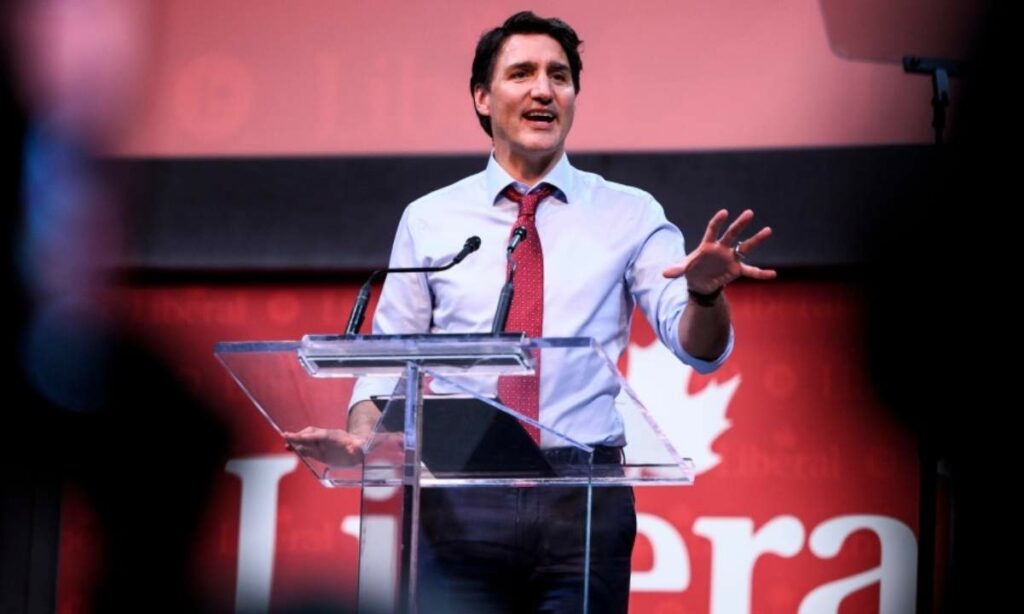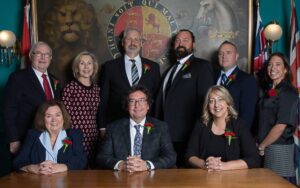
Liberal Party faithful met in Ottawa last week for their first in-person national convention in five years. Justin Trudeau kicked off the festivities Thursday with a rousing speech designed to galvanize the base ahead of 2025. Photo credit: The Canadian Press/Justin Tang
Marking the first in-person convention since 2018, Liberals from across Canada came together in Ottawa last week to meet, talk policy and, most importantly, re-energize their core supports.
Five years ago, the Liberals landed in Halifax for a three-day event like the one last week, but much has changed since then. Yes, there was a virtual convention in 2021, but much like the workplace happy hours at the start of the pandemic, that does not really count. Back then, Liberals were still riding high on their sunny ways, Donald Trump was in the early days of his presidency, and no one knew who Teresa Tam was and an election date was set in stone for the following year.
Skipping ahead to now, the Liberals find themselves in a much different place. They are statistically tied with the Conservatives, a place they have been in before and won, but this time is different. The shine of sunny days has turned into dark and stormy ways, and some are seriously questioning Prime Minister Justin Trudeau’s ability to lead or even win the next election – not a place that Liberal supporters or even those closest to the Prime Minister thought they would ever be in.
For a political party, conventions are a good litmus test on the mood of their most faithful supporters and an opportunity to create momentum. Though the Prime Minister had to bow out early to attend the coronation of King Charles, he was centre stage on opening night to deliver an election-style speech to motivate the base.
In his speech, Trudeau outlined the Canada he wants to see, attacked Pierre Poilievre’s populist style of campaigning, and not so subtly hinted that he will lead the party into the next election. As it goes when you preach to the choir, his speech was met with loud cheers, positive energy, and a standing ovation. It was as if the 2015 Justin Trudeau that Canada fell in love with and gave a majority government to was back.
Over the succeeding two days, former Prime Minister Jean Chrétien and Hillary Rodham Clinton took centre stage to build on the momentum that Trudeau created. Though, the actual work happened outside in breakout rooms and policy sessions. The Liberals pride themselves in being a grassroots party, one that listens to their members. This means that Liberal members are able to create and suggest policy ideas for the next election.
Though not binding, the Liberals have been known to use some policy resolutions in their platforms. Most notably, the idea of legalizing cannabis came from a convention ahead of the 2015 election. A policy which gained them great coverage in the media and on the campaign trail.
At this year’s convention, members passed 24 policy ideas. Of note, the party agreed to expand affordable housing, build high-speed rail between Ontario and Quebec, provide civil servants with four weeks of paid vacation, and establish a guaranteed basic income for Canadians. While party members rejected the idea of campaigning on a promise to balance the budget or require voting to be mandatory.
If the policy ideas adopted by party members are an indicator of the Liberal Party and how they plan to tackle the next election, it is clear not much has changed. Their focus remains on social issues with little regard for the taxpayer or much thought toward fiscal policy.
They see their path to victory as one that relies on creating greater government support to drive innovation, greater social nets, and a stronger public service to deliver these services, which will be a sharp contrast to their main opposition in the Conservative Party.
If anything can be gleaned from the Liberals being in Ottawa, it’s that they are looking to stay in power and believe that their current path is the best path to ensure that happens. Repeating their greatest hits has worked for them in the past three elections, but can they make it a fourth?

Daniel Perry is a Senior Consultant with Hill & Knowlton, Canada’s leading public relations and public affairs firm. He is an experienced campaigner and has provided political advice at all levels of government. Daniel has received a number of awards during his career including being voted Ottawa’s top consultant by his peers.




















